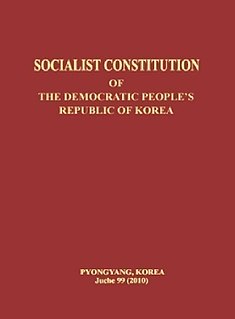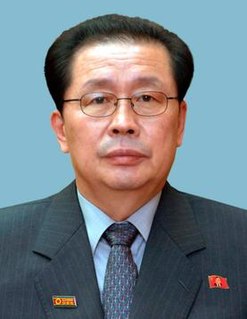Related Research Articles

The politics of North Korea takes place within the framework of the official state philosophy, Juche, a concept created by Hwang Jang-yop and later attributed to Kim Il-sung. The Juche theory is the belief that through self-reliance and a strong independent state, true socialism can be achieved.

Kim Jong-il was the second leader of North Korea. He ruled from the death of his father Kim Il-sung, the first leader of North Korea in 1994 until his own death in 2011.

Juche is the official state ideology of North Korea, described by the government as "Kim Il-sung's original, brilliant and revolutionary contribution to national and international thought". It postulates that "man is the master of his destiny", that the Korean masses are to act as the "masters of the revolution and construction" and that by becoming self-reliant and strong, a nation can achieve true socialism.
Kim Jong-chul, sometimes spelled Kim Jong Chol, is a son of former North Korean Supreme Leader Kim Jong-il. His younger brother is Kim Jong-un, now the leader of North Korea. His older half-brother was Kim Jong-nam, who was assassinated in February 2017.

The Korean Central News Agency (KCNA) is the state news agency of North Korea. The agency portrays the views of the North Korean government for both domestic and foreign consumption. It was established on December 5, 1946 and now features internet coverage.

The Socialist Constitution of the Democratic People's Republic of Korea is the constitution of North Korea. It was approved by the 6th Supreme People's Assembly at its first session on 27 December 1972, and has been amended and supplemented in 1998, 2009, 2012, 2013, 2016 and 2019. It replaced the country's first constitution which was approved in 1948.

In the North Korean government, the Cabinet is the administrative and executive body. The North Korean government consists of three branches: administrative, legislative, and judicial. However, they are not independent of each other.

Kim Jong-un is a North Korean politician who has been the supreme leader of North Korea since 2011 and chairman of the Workers' Party of Korea since 2012. He is the second child of Kim Jong-il (1941–2011), who was North Korea's second leader from 1994 to 2011, and Ko Yong-hui (1952–2004). He is the grandson of Kim Il-sung, who was the founder and led North Korea from its establishment in 1948 until his death in 1994.

Kim Sŏng-ae was a North Korean politician who served as the First Lady of North Korea from 1963 to 1974. She was the third wife of the President of North Korea, Kim Il-sung.

Jang Song-thaek was a leading figure in the government of North Korea. He was married to Kim Kyong-hui, the only daughter of North Korean President Kim Il-sung, and only sister of North Korean General Secretary Kim Jong-il. He was therefore the uncle of current leader of North Korea, Kim Jong-un.

The Workers' Party of Korea (WPK) is the founding and ruling political party of North Korea. It is the largest party represented in the Supreme People's Assembly and coexists de jure with two other legal parties making up the Democratic Front for the Reunification of the Fatherland. However, these minor parties are completely subservient to the WPK, and must accept the WPK's "leading role" as a condition of their existence.

The death of Kim Jong-il was reported by North Korean state television news on 19 December 2011. The presenter Ri Chun-hee announced that he had died on 17 December at 8:30 am of a massive heart attack while travelling by train to an area outside Pyongyang. Reportedly, he had received medical treatment for cardiac and cerebrovascular diseases. During the trip though, he was said to have had an advanced acute myocardial infarction, complicated with a serious heart shock. However, it was reported by South Korean media in December 2012 that he had died in a fit of rage over construction faults at a crucial power plant project.

Korean revolutionary opera is a tradition of revolutionary opera in North Korea based on that of China during the Cultural Revolution. It is characterized by a highly melodramatic style and reoccurring themes of patriotism and glorification of Juche, President Kim Il Sung, and the working people, as well as a focus on socialist realist themes. Composers of North Korean revolutionary opera are employed by the North Korean government and the fundamental principles of North Korean revolutionary opera were dictated by Kim Jong-Il in his speech On the Art of Opera.

The North Korean cult of personality surrounding its ruling family, the Kim family, has existed in North Korea for decades and can be found in many examples of North Korean culture. Although not acknowledged by the North Korean government, many defectors and Western visitors state there are often stiff penalties for those who criticize or do not show "proper" respect for the regime. The personality cult began soon after Kim Il-sung took power in 1948, and was greatly expanded after his death in 1994.

Kim Jong-il was the Supreme Leader of North Korea from 1994 to 2011.

On further improving party ideological work was the March 8, 1981 concluding speech by Kim Jong-il at the National Meeting of Party Propagandists in North Korea.

On the further improvement of the health service is an April 21, 1985 letter by Kim Jong-il to the National Conference of Health Workers in North Korea.

Ten Principles for the Establishment of a Monolithic Ideological System are a set of ten principles and sixty-five clauses which is used to establish standards for governance and guide the behaviors of the people of North Korea.

On the Art of the Cinema is a 1973 treatise by the North Korean leader Kim Jong-il. It is considered the most authoritative work on North Korean filmmaking.

The Order of Kim Jong-il is a North Korean order named after Kim Jong-il, the former leader of North Korea.
References
- ↑ Democratic People's Republic of Korea - Books and Articles (Archived April 4, 2013, at WebCite )

